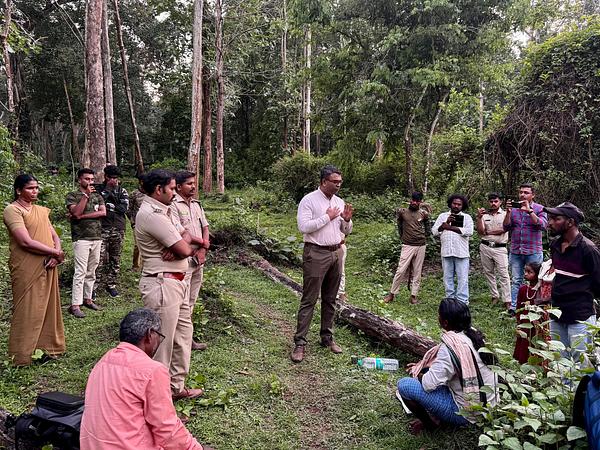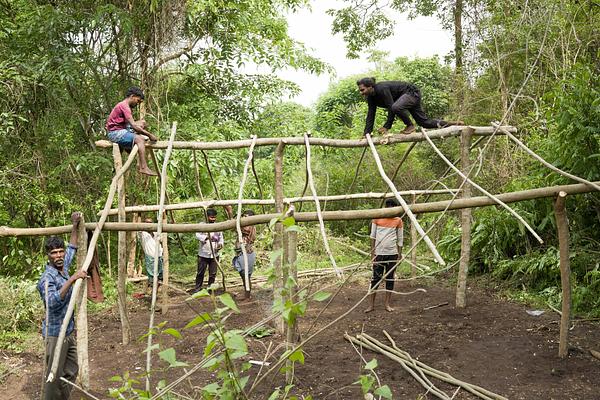A group of Indigenous people who authorities evicted from their ancestral village in Nagarhole Tiger Reserve in south India 40 years ago, have returned to their former homes. The 52 Jenu Kuruba families faced down 130 police and forest guards to do so on Tuesday 6 May. And, on Wednesday, they declared they are there to stay permanently.
The community has begun to build new houses to replace the ones they were forced to leave 40 years ago. A small group of police and forest guards remain at the site.
Jenu Kuruba: Indigenous people return to their ancestral homes in Nagarhole
Their return on Tuesday was an act of tremendous courage, as forest guards had previously shot some Jenu Kuruba. More than 50 Jenu Kuruba families took part in the long-planned operation. Some carried pictures of loved ones who had died since the community’s expulsion from the forest.
Shivu, a young Jenu Kuruba leader, said:
We have today returned to our homelands and forests. We will remain here. Our sacred spirits are with us.
It’s believed to be the first time Indigenous people in India have asserted their rights in this way, to return en masse to their homes after they were evicted from a Protected Area.
Shivu added:
Historical injustice continues to happen over us by denying our rights on our lands, forests and access to sacred spaces. Tiger conservation is a scheme of the forest department and various wildlife NGOs to grab indigenous lands by forcefully moving us out.
When Forest Department officials and police confronted the Jenu Kuruba and warned them against re-occupying their homes on Tuesday, the Indigenous people castigated them for delays in recognizing their forest rights – and then went ahead:

Some have begun to build houses, using their traditional materials and techniques:

Authorities in India have illegally evicted an estimated 20,000 Jenu Kuruba people from Nagarhole. Another 6,000 resisted and have managed to stay in the park.
On Wednesday 7 May, police officers and forest guards stayed on the scene, and prevented journalists accessing the area.
The Jenu Kuruba say they decided to return because their sacred spirits, who still dwell in the old village location, became angry at being abandoned when the community was forced from the forest.
‘We resist the current conservation model’: wildlife and humans can coexist
The Jenu Kuruba of Nagarhole issued a statement:
Enough is Enough. We can’t part from our lands anymore. We want our children and youth to live a life that our ancestors once lived.
Tigers, elephants, peacocks, wild boar, wild dogs are our deities. We have been worshiping them as our ancestral spirits for generations. This deliberate attempt to separate us from our lands, forests and sacred spaces will not be tolerated. We resist the current conservation model based on the false idea that forests, wildlife and humans cannot coexist.
For decades it has been official policy in India, as in many other countries around the world, to evict Indigenous people from ancestral lands in the name of conservation. In many instances, states turn their lands are into Protected Areas, a practice known as Fortress Conservation.
The Jenu Kuruba’s belief system centers around their connection to the forest, its wildlife, and their gods. This includes the tigers who live there. However, forest guards harass, threaten, and even shoot members of the community. Those beliefs underpin the community’s careful management of their environment and have ensured tiger survival. Indeed, the healthy tiger population found in their forest is what drove the Indian government to turn the area into a Tiger Reserve. It has one of the highest concentrations of tigers in all of India.
Director of Survival International Caroline Pearce said:
The Jenu Kuruba people’s re-occupation of their ancestral land is an inspirational act of repossession. They’re reclaiming what is theirs, in defiance of a hugely powerful conservation and tourism industry that has enriched itself at their expense.
If the Indian government really cares about tiger conservation, it will not only allow the Jenu Kuruba people to return, but encourage them to do so – because the science is clear that tigers thrive alongside the Indigenous people whose forests they live in.
Images via Sartaz Ali Barkat/ Survival
















